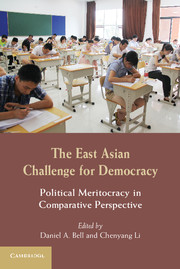Book contents
- Frontmatter
- Dedication
- Contents
- Contributing Authors
- Acknowledgments
- Introduction
- Section I The Theory of Political Meritocracy
- Section II The History of Political Meritocracy
- Section III Realizing Political Meritocracy Today
- 9 How East Asians View Meritocracy
- 10 Political Meritocracy in Singapore
- 11 Meritocracy and Political Liberalization in Singapore
- 12 China's Meritocratic Examinations and the Ideal of Virtuous Talents
- 13 Reflections on Political Meritocracy
- 14 Political Meritocracy and Direct Democracy
- Index
- References
12 - China's Meritocratic Examinations and the Ideal of Virtuous Talents
Published online by Cambridge University Press: 05 June 2014
- Frontmatter
- Dedication
- Contents
- Contributing Authors
- Acknowledgments
- Introduction
- Section I The Theory of Political Meritocracy
- Section II The History of Political Meritocracy
- Section III Realizing Political Meritocracy Today
- 9 How East Asians View Meritocracy
- 10 Political Meritocracy in Singapore
- 11 Meritocracy and Political Liberalization in Singapore
- 12 China's Meritocratic Examinations and the Ideal of Virtuous Talents
- 13 Reflections on Political Meritocracy
- 14 Political Meritocracy and Direct Democracy
- Index
- References
Summary
Emphasis on both moral character and talent in selecting government officials has been an intrinsic part of China's meritocratic tradition. From early on, mainstream Chinese political philosophy, particularly of the Confucian heritage, has promoted such an ideal. This quest, however, has also encountered perennial challenges in practice. In this chapter, we examine in historic context the ideal and practice of integrating moral character with talent in selecting government officials. We show that, despite difficulties, searching for virtuous talent in China today has evolved into the most comprehensive and sophisticated process of its kind in history. The first section of this chapter retrieves the history of China's civil examinations and its problems. The second section investigates recent evolutions of China's public servant recruitment as a stepping stone into officialdom. The third section focuses on China's recent reform in the selection of government officials. Finally, we examine to what extent the reformed system causes corruption in China.
A Brief History of China's Civil Service Examinations
The long and complex history of China's civil service examinations has been studied extensively. We do not intend to present a comprehensive or balanced history here. Building on work by others, we highlight some points and aspects to set the stage for our argument.
- Type
- Chapter
- Information
- The East Asian Challenge for DemocracyPolitical Meritocracy in Comparative Perspective, pp. 340 - 362Publisher: Cambridge University PressPrint publication year: 2013
References
- 5
- Cited by



